Unit 12 What did you do last weekend? Section B 2a-shelf check 课件(共22张PPT)
文档属性
| 名称 | Unit 12 What did you do last weekend? Section B 2a-shelf check 课件(共22张PPT) |
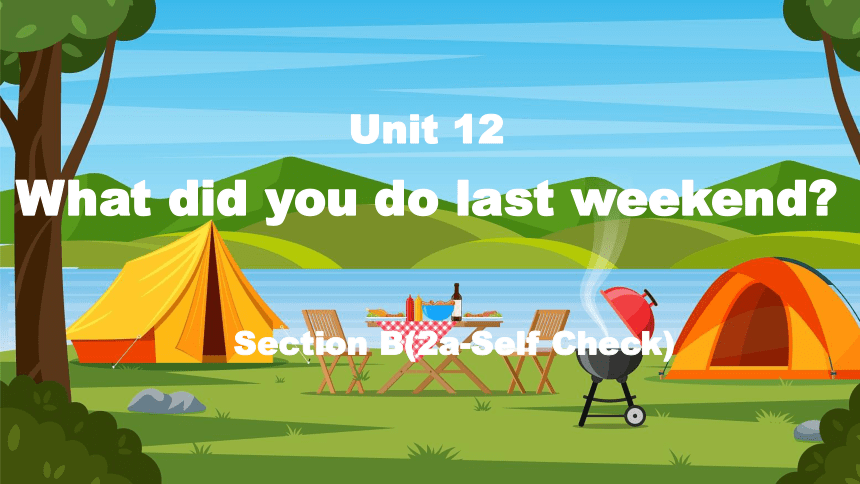
|
|
| 格式 | pptx | ||
| 文件大小 | 4.7MB | ||
| 资源类型 | 教案 | ||
| 版本资源 | 人教新目标(Go for it)版 | ||
| 科目 | 英语 | ||
| 更新时间 | 2024-04-08 14:26:12 | ||
图片预览

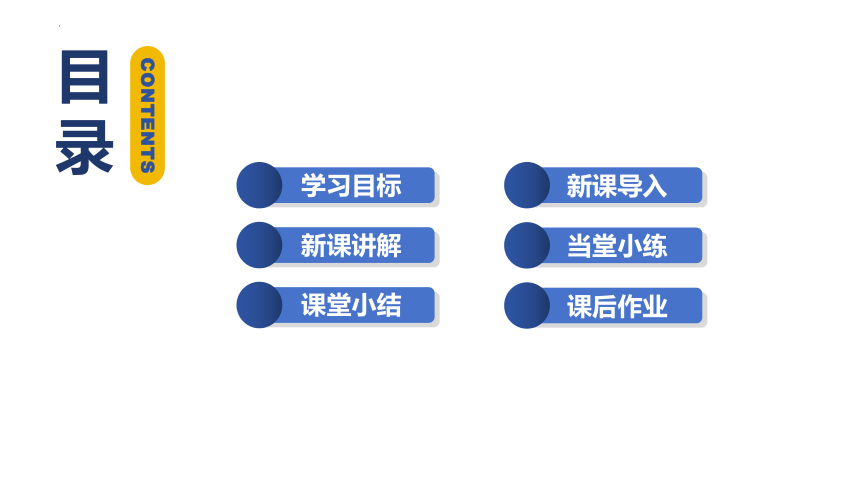
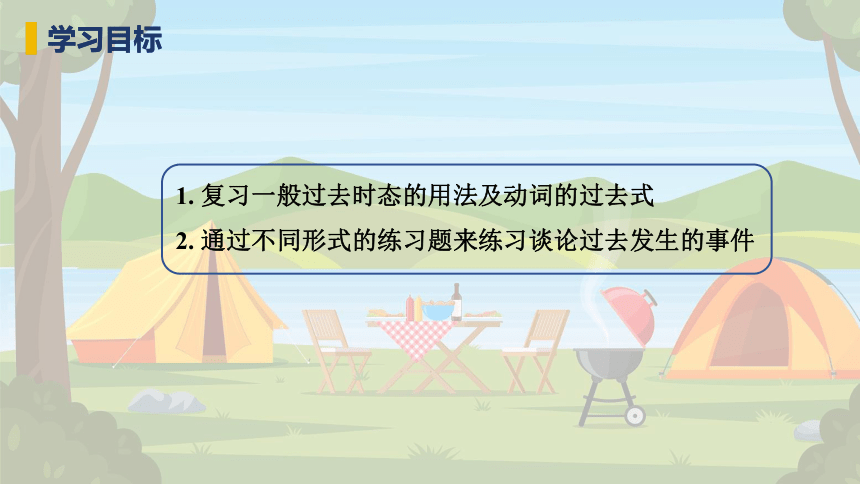
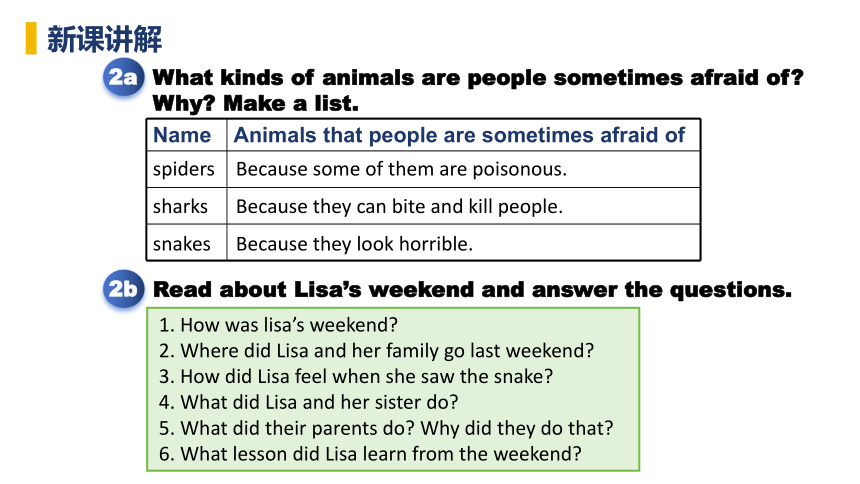
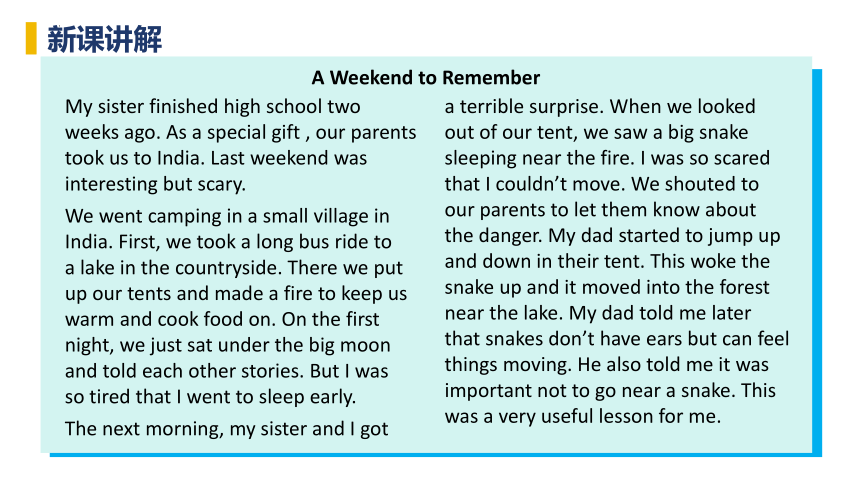
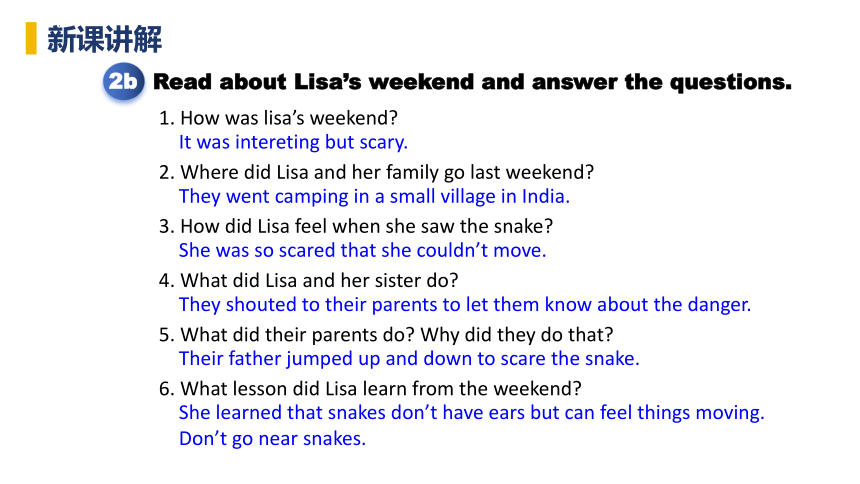
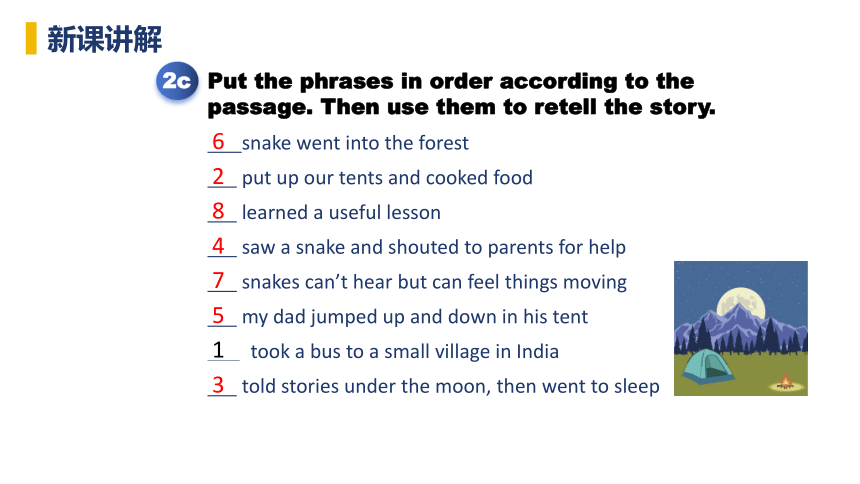

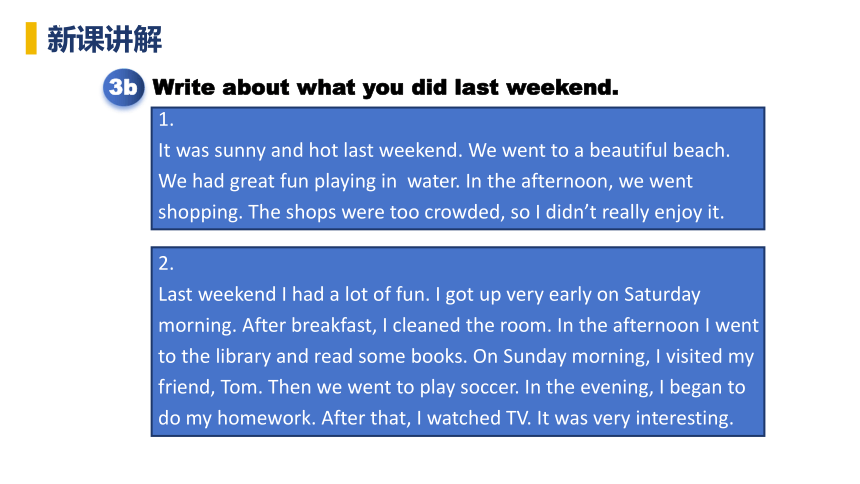
文档简介
(共22张PPT)
What did you do last weekend
Section B(2a-Self Check)
Unit 12
目
录
CONTENTS
学习目标
新课讲解
课堂小结
新课导入
当堂小练
课后作业
1. 复习一般过去时态的用法及动词的过去式
2. 通过不同形式的练习题来练习谈论过去发生的事件
学习目标
What kinds of animals are people sometimes afraid of Why Make a list.
Name Animals that people are sometimes afraid of
2a
spiders
sharks
snakes
Because some of them are poisonous.
Because they can bite and kill people.
Because they look horrible.
Read about Lisa’s weekend and answer the questions.
2b
1. How was lisa’s weekend
2. Where did Lisa and her family go last weekend
3. How did Lisa feel when she saw the snake
4. What did Lisa and her sister do
5. What did their parents do Why did they do that
6. What lesson did Lisa learn from the weekend
My sister finished high school two
weeks ago. As a special gift , our parents
took us to India. Last weekend was
interesting but scary.
We went camping in a small village in
India. First, we took a long bus ride to
a lake in the countryside. There we put
up our tents and made a fire to keep us
warm and cook food on. On the first
night, we just sat under the big moon
and told each other stories. But I was
so tired that I went to sleep early.
The next morning, my sister and I got
a terrible surprise. When we looked
out of our tent, we saw a big snake
sleeping near the fire. I was so scared
that I couldn’t move. We shouted to
our parents to let them know about
the danger. My dad started to jump up
and down in their tent. This woke the
snake up and it moved into the forest
near the lake. My dad told me later
that snakes don’t have ears but can feel
things moving. He also told me it was
important not to go near a snake. This
was a very useful lesson for me.
A Weekend to Remember
Read about Lisa’s weekend and answer the questions.
2b
1. How was lisa’s weekend
2. Where did Lisa and her family go last weekend
3. How did Lisa feel when she saw the snake
4. What did Lisa and her sister do
5. What did their parents do Why did they do that
6. What lesson did Lisa learn from the weekend
It was intereting but scary.
They went camping in a small village in India.
She was so scared that she couldn’t move.
They shouted to their parents to let them know about the danger.
Their father jumped up and down to scare the snake.
She learned that snakes don’t have ears but can feel things moving. Don’t go near snakes.
Put the phrases in order according to the passage. Then use them to retell the story.
snake went into the forest
put up our tents and cooked food
learned a useful lesson
saw a snake and shouted to parents for help
snakes can’t hear but can feel things moving
my dad jumped up and down in his tent
___ took a bus to a small village in India
told stories under the moon, then went to sleep
7
2
8
4
5
6
3
1
2c
Look at the pictures and complete the passage.
3a
I had a busy weekend. On Saturday morning, I _________________. In the afternoon, I _________________. It was a little difficult. OnSaturday night, I stayed at home and _________________ cook dinner. On Sunday morning, I _________________. I read a book about history. Then in the afternoon, I _____________ with my friends. On Sunday night, I ___________. I saw an interesting talk show.
cleaned the room
did (my) homework
helped my mother
went to the library
played soccer
watched TV
Saturday
Sunday
Write about what you did last weekend.
3b
1.
It was sunny and hot last weekend. We went to a beautiful beach. We had great fun playing in water. In the afternoon, we went shopping. The shops were too crowded, so I didn’t really enjoy it.
2.
Last weekend I had a lot of fun. I got up very early on Saturday morning. After breakfast, I cleaned the room. In the afternoon I went to the library and read some books. On Sunday morning, I visited my friend, Tom. Then we went to play soccer. In the evening, I began to do my homework. After that, I watched TV. It was very interesting.
Role play
One is Vera’s friend. The other is Vera. Talk about Vera’s vacation. Use the information in the chart below.
Where did…
What did…
Did you…
How was…
How were…
Self Check
1. Complete the phrases. Then use some of them in the past forms to write a story.
____ out with friends
____ for a walk
____ apples
____ photos
fly a ____
milk a ____
go
go
eat
take
camp ____ the lake
study ____ a test
kite
cow
by
for
A: I had a school trip last week.
B: Really. ____________________ (go)
A: I visited the fire station.
B: ____________________ (go with)
A: I went with my classmates.
B: ____________________ (do)
A: We watched how firemen worked. What an interesting job they have!
B: ____________________ (learn anything)
A: Sure. We learned how to call the fire station and what to do when there is a fire.
Self Check
2. Complete the conversation.
Where did you go
Who did you go with
What did you do
Did you learn anything
Imagine you are an American student on vacation in Beijing. Write a travel diary.(The following pictures can help you)
Thursday, August 1st
Today I went to the Palace Museum. It was cool, then I …
the Palace Museum
Tian’an men Square
the Great Wall
a Beijing Hutong
归 纳
1. Phrases: go out with friends fly a kite
go for a walk milk a cow
pick apples camp near the lake
take photos study for a test
2. Sentences:
①Where did you go
②Whom did you go with
③What did you do
④Did you learn anything
Unit 12 What did you do last weekend
Section B(2a-Self Check)
要 点
1. My sister finished high school two weeks ago. 两周前我姐姐中学毕业了。(教材第71页2b)
ago 副词,意为“以前”。“时间段+ago”表示“某段时间以前”,常用于一般过去时的句子中。
I met him a few minutes ago. 我几分钟前碰到过他。
He went to Beijing two days ago. 两天前他去了北京。
2. There we put up our tents and made a fire to keep us warm and cook food on. 在那里我们搭起帐篷,生火取暖并做饭。(教材第71页2b)
put up 此处意为“搭起”,还可表示“举起;张贴”。
It’s going to rain. Let’s put up the tent. 天要下雨了,我们把帐篷搭起来吧。
If you know the answer, please put up your hand. 如果你知道答案,请举手。
They put up a map on the wall. 他们在墙上贴了一张地图。
要 点
3. But I was so tired that I went to sleep early. 但是我太累了,所以早早地睡着了。(教材第71页2b)
so ... that ... 意为“如此……以至于……”,引导结果状语从句。其中,so是副词,常用来修饰形容词或副词。
The box is so heavy that I can’t move it away. 这个箱子太重了,我搬不走它。
【名师提醒】
当so ... that ...中that后的从句为肯定句时,可与enough to do 进行句型转换;that后的从句为否定句时,可与too ... to ...转换。
He ran so fast that he won the race. = He ran fast enough to win the race.
他跑得很快,赢得了这场比赛。
The child is so young that he can’t go to school. = The child is too young to go to school. 这个孩子太小,不能去上学。
要 点
4. The next morning, my sister and I got a terrible surprise. 第二天早上,我和姐姐大吃一惊。(教材第71页2b)
surprise 的用法如下:
I got a surprise when I saw the bill. 我一看账单吃了一惊。
John turned around and looked at us in surprise. 约翰转过身,吃惊地望着我们。
To my surprise, she walked out without saying a word. 令我吃惊的是,她一句话也没说就走了出去。
afraid
可数名词,意为“惊奇;惊讶”,get a surprise吃惊
不可数名词,意为“惊奇;惊讶”,in surprise惊奇地;惊讶地;to one’s surprise使某人惊讶的是
及物动词,意为“使吃惊;使惊奇”
The news greatly surprised them. 这则新闻使他们大为吃惊。
要 点
5. When we looked out of our tent, we saw a big snake sleeping near the fire. 我们向帐篷外面看去时,看见一条大蛇正在篝火附近睡觉。(教材第71页2b)
look out of 意为“向……外看”。
I saw Tom playing football with his friends. 我看见汤姆正在和他的朋友们踢足球。
I saw him go into the shop. 我看见他进了商店。
Don’t look out of the window. 别向窗外看。
see sb. doing sth. 意为“看见某人正在做某事”。
I saw the children flying kites in the park. 我看见孩子们正在公园里放风筝。
【辨析】see sb. doing sth. 与 see sb. do sth.
see sb. doing sth. “看见某人正在做某事”,强调看到动作正在在进行
see sb. do sth. “看见某人做某事”,强调看到动作的全过程或动作经常发生
要 点
6. I was so scared that I couldn’t move. 我是那么害怕,一动也不敢动。(教材第71页2b)
scared 形容词,意为“惊慌的;吓坏了的”。常用搭配:be scared of sb./sth. “害怕某人/某物”,be scared to do sth. 害怕做某事“。
Don’t move, or you’ll be in danger! 不要动,否则你会有危险!
My family moved to Beijing two years ago. 两年前我们全家搬到了北京。
I was so scared of the big dog. 这害怕这只大狗。
move 此处作不及物动词,意为“移动”,后接地点名词作宾语时,须带介词to,表示“搬到……”。
【辨析】scared 与 scary
scared “惊慌的;吓坏了的”,常说明人的感受
scary “吓人的;恐怖的”,常说明事物所具有的特征
He was scared to swim in the river. 他害怕在河里游泳。
要 点
7. My dad started to jump up and down in their tent. 我爸爸开始在他们的帐篷里上下跳动。(教材第71页2b)
start 动词,意为“开始;着手”,相当于begin。
start to do sth.(=start doing sth.) 意为“开始做某事”。
Please wake up Lucy at six o’clock. = Please wake Lucy up at six o’clock.
请在六点钟叫醒露西。
Lily is sleeping. Don’t wake her up. 莉莉在睡觉,别叫醒她。
She started to play/started playing the guitar when she was six. 她六岁开始弹吉他。
wake ... up 意为“把……弄醒”,接名词作宾语时,名词放在up前后均可;接代词作宾语时,代词只能放在wake与up之间。
up and down 意为“上上下下;起伏”,在句中作状语。
Tom is jumping up and down happily. 汤姆正在高兴地跳上跳下。
8. This woke the snake up and it moved into the forest near the lake. 这把蛇惊醒了,它爬进了湖边的森林里。(教材第71页2b)
Thanks!
What did you do last weekend
Section B(2a-Self Check)
Unit 12
目
录
CONTENTS
学习目标
新课讲解
课堂小结
新课导入
当堂小练
课后作业
1. 复习一般过去时态的用法及动词的过去式
2. 通过不同形式的练习题来练习谈论过去发生的事件
学习目标
What kinds of animals are people sometimes afraid of Why Make a list.
Name Animals that people are sometimes afraid of
2a
spiders
sharks
snakes
Because some of them are poisonous.
Because they can bite and kill people.
Because they look horrible.
Read about Lisa’s weekend and answer the questions.
2b
1. How was lisa’s weekend
2. Where did Lisa and her family go last weekend
3. How did Lisa feel when she saw the snake
4. What did Lisa and her sister do
5. What did their parents do Why did they do that
6. What lesson did Lisa learn from the weekend
My sister finished high school two
weeks ago. As a special gift , our parents
took us to India. Last weekend was
interesting but scary.
We went camping in a small village in
India. First, we took a long bus ride to
a lake in the countryside. There we put
up our tents and made a fire to keep us
warm and cook food on. On the first
night, we just sat under the big moon
and told each other stories. But I was
so tired that I went to sleep early.
The next morning, my sister and I got
a terrible surprise. When we looked
out of our tent, we saw a big snake
sleeping near the fire. I was so scared
that I couldn’t move. We shouted to
our parents to let them know about
the danger. My dad started to jump up
and down in their tent. This woke the
snake up and it moved into the forest
near the lake. My dad told me later
that snakes don’t have ears but can feel
things moving. He also told me it was
important not to go near a snake. This
was a very useful lesson for me.
A Weekend to Remember
Read about Lisa’s weekend and answer the questions.
2b
1. How was lisa’s weekend
2. Where did Lisa and her family go last weekend
3. How did Lisa feel when she saw the snake
4. What did Lisa and her sister do
5. What did their parents do Why did they do that
6. What lesson did Lisa learn from the weekend
It was intereting but scary.
They went camping in a small village in India.
She was so scared that she couldn’t move.
They shouted to their parents to let them know about the danger.
Their father jumped up and down to scare the snake.
She learned that snakes don’t have ears but can feel things moving. Don’t go near snakes.
Put the phrases in order according to the passage. Then use them to retell the story.
snake went into the forest
put up our tents and cooked food
learned a useful lesson
saw a snake and shouted to parents for help
snakes can’t hear but can feel things moving
my dad jumped up and down in his tent
___ took a bus to a small village in India
told stories under the moon, then went to sleep
7
2
8
4
5
6
3
1
2c
Look at the pictures and complete the passage.
3a
I had a busy weekend. On Saturday morning, I _________________. In the afternoon, I _________________. It was a little difficult. OnSaturday night, I stayed at home and _________________ cook dinner. On Sunday morning, I _________________. I read a book about history. Then in the afternoon, I _____________ with my friends. On Sunday night, I ___________. I saw an interesting talk show.
cleaned the room
did (my) homework
helped my mother
went to the library
played soccer
watched TV
Saturday
Sunday
Write about what you did last weekend.
3b
1.
It was sunny and hot last weekend. We went to a beautiful beach. We had great fun playing in water. In the afternoon, we went shopping. The shops were too crowded, so I didn’t really enjoy it.
2.
Last weekend I had a lot of fun. I got up very early on Saturday morning. After breakfast, I cleaned the room. In the afternoon I went to the library and read some books. On Sunday morning, I visited my friend, Tom. Then we went to play soccer. In the evening, I began to do my homework. After that, I watched TV. It was very interesting.
Role play
One is Vera’s friend. The other is Vera. Talk about Vera’s vacation. Use the information in the chart below.
Where did…
What did…
Did you…
How was…
How were…
Self Check
1. Complete the phrases. Then use some of them in the past forms to write a story.
____ out with friends
____ for a walk
____ apples
____ photos
fly a ____
milk a ____
go
go
eat
take
camp ____ the lake
study ____ a test
kite
cow
by
for
A: I had a school trip last week.
B: Really. ____________________ (go)
A: I visited the fire station.
B: ____________________ (go with)
A: I went with my classmates.
B: ____________________ (do)
A: We watched how firemen worked. What an interesting job they have!
B: ____________________ (learn anything)
A: Sure. We learned how to call the fire station and what to do when there is a fire.
Self Check
2. Complete the conversation.
Where did you go
Who did you go with
What did you do
Did you learn anything
Imagine you are an American student on vacation in Beijing. Write a travel diary.(The following pictures can help you)
Thursday, August 1st
Today I went to the Palace Museum. It was cool, then I …
the Palace Museum
Tian’an men Square
the Great Wall
a Beijing Hutong
归 纳
1. Phrases: go out with friends fly a kite
go for a walk milk a cow
pick apples camp near the lake
take photos study for a test
2. Sentences:
①Where did you go
②Whom did you go with
③What did you do
④Did you learn anything
Unit 12 What did you do last weekend
Section B(2a-Self Check)
要 点
1. My sister finished high school two weeks ago. 两周前我姐姐中学毕业了。(教材第71页2b)
ago 副词,意为“以前”。“时间段+ago”表示“某段时间以前”,常用于一般过去时的句子中。
I met him a few minutes ago. 我几分钟前碰到过他。
He went to Beijing two days ago. 两天前他去了北京。
2. There we put up our tents and made a fire to keep us warm and cook food on. 在那里我们搭起帐篷,生火取暖并做饭。(教材第71页2b)
put up 此处意为“搭起”,还可表示“举起;张贴”。
It’s going to rain. Let’s put up the tent. 天要下雨了,我们把帐篷搭起来吧。
If you know the answer, please put up your hand. 如果你知道答案,请举手。
They put up a map on the wall. 他们在墙上贴了一张地图。
要 点
3. But I was so tired that I went to sleep early. 但是我太累了,所以早早地睡着了。(教材第71页2b)
so ... that ... 意为“如此……以至于……”,引导结果状语从句。其中,so是副词,常用来修饰形容词或副词。
The box is so heavy that I can’t move it away. 这个箱子太重了,我搬不走它。
【名师提醒】
当so ... that ...中that后的从句为肯定句时,可与enough to do 进行句型转换;that后的从句为否定句时,可与too ... to ...转换。
He ran so fast that he won the race. = He ran fast enough to win the race.
他跑得很快,赢得了这场比赛。
The child is so young that he can’t go to school. = The child is too young to go to school. 这个孩子太小,不能去上学。
要 点
4. The next morning, my sister and I got a terrible surprise. 第二天早上,我和姐姐大吃一惊。(教材第71页2b)
surprise 的用法如下:
I got a surprise when I saw the bill. 我一看账单吃了一惊。
John turned around and looked at us in surprise. 约翰转过身,吃惊地望着我们。
To my surprise, she walked out without saying a word. 令我吃惊的是,她一句话也没说就走了出去。
afraid
可数名词,意为“惊奇;惊讶”,get a surprise吃惊
不可数名词,意为“惊奇;惊讶”,in surprise惊奇地;惊讶地;to one’s surprise使某人惊讶的是
及物动词,意为“使吃惊;使惊奇”
The news greatly surprised them. 这则新闻使他们大为吃惊。
要 点
5. When we looked out of our tent, we saw a big snake sleeping near the fire. 我们向帐篷外面看去时,看见一条大蛇正在篝火附近睡觉。(教材第71页2b)
look out of 意为“向……外看”。
I saw Tom playing football with his friends. 我看见汤姆正在和他的朋友们踢足球。
I saw him go into the shop. 我看见他进了商店。
Don’t look out of the window. 别向窗外看。
see sb. doing sth. 意为“看见某人正在做某事”。
I saw the children flying kites in the park. 我看见孩子们正在公园里放风筝。
【辨析】see sb. doing sth. 与 see sb. do sth.
see sb. doing sth. “看见某人正在做某事”,强调看到动作正在在进行
see sb. do sth. “看见某人做某事”,强调看到动作的全过程或动作经常发生
要 点
6. I was so scared that I couldn’t move. 我是那么害怕,一动也不敢动。(教材第71页2b)
scared 形容词,意为“惊慌的;吓坏了的”。常用搭配:be scared of sb./sth. “害怕某人/某物”,be scared to do sth. 害怕做某事“。
Don’t move, or you’ll be in danger! 不要动,否则你会有危险!
My family moved to Beijing two years ago. 两年前我们全家搬到了北京。
I was so scared of the big dog. 这害怕这只大狗。
move 此处作不及物动词,意为“移动”,后接地点名词作宾语时,须带介词to,表示“搬到……”。
【辨析】scared 与 scary
scared “惊慌的;吓坏了的”,常说明人的感受
scary “吓人的;恐怖的”,常说明事物所具有的特征
He was scared to swim in the river. 他害怕在河里游泳。
要 点
7. My dad started to jump up and down in their tent. 我爸爸开始在他们的帐篷里上下跳动。(教材第71页2b)
start 动词,意为“开始;着手”,相当于begin。
start to do sth.(=start doing sth.) 意为“开始做某事”。
Please wake up Lucy at six o’clock. = Please wake Lucy up at six o’clock.
请在六点钟叫醒露西。
Lily is sleeping. Don’t wake her up. 莉莉在睡觉,别叫醒她。
She started to play/started playing the guitar when she was six. 她六岁开始弹吉他。
wake ... up 意为“把……弄醒”,接名词作宾语时,名词放在up前后均可;接代词作宾语时,代词只能放在wake与up之间。
up and down 意为“上上下下;起伏”,在句中作状语。
Tom is jumping up and down happily. 汤姆正在高兴地跳上跳下。
8. This woke the snake up and it moved into the forest near the lake. 这把蛇惊醒了,它爬进了湖边的森林里。(教材第71页2b)
Thanks!
同课章节目录
- Unit 1 Can you play the guitar?
- Section A
- Section B
- Unit 2 What time do you go to school?
- Section A
- Section B
- Unit 3 How do you get to school?
- Section A
- Section B
- Unit 4 Don't eat in class.
- Section A
- Section B
- Unit 5 Why do you like pandas?
- Section A
- Section B
- Unit 6 I'm watching TV.
- Section A
- Section B
- Review of Units 1-6
- Unit 7 It's raining!
- Section A
- Section B
- Unit 8 Is there a post office near here?
- Section A
- Section B
- Unit 9 What does he look like?
- Section A
- Section B
- Unit 10 I'd like some noodles.
- Section A
- Section B
- Unit 11 How was your school trip?
- Section A
- Section B
- Unit 12 What did you do last weekend?
- Section A
- Section B
